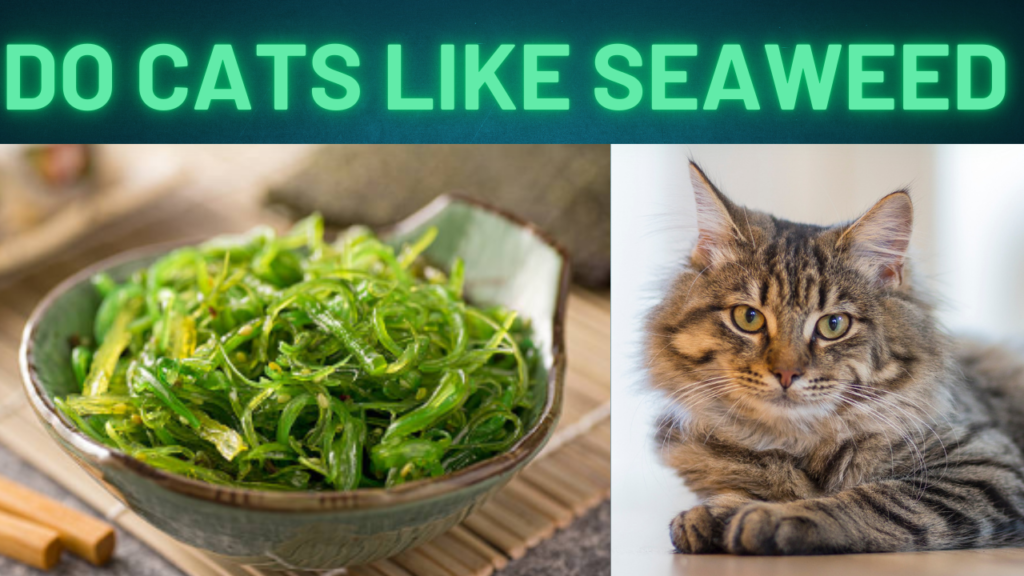Cats are known for their peculiar eating habits and unique preferences, but one surprising question that many pet owners ask is, do cats like seaweed? As more pet owners seek to provide their cats with a balanced, nutritious diet, seaweed has gained attention due to its potential health benefits. In this article, we will explore whether cats like seaweed, the health benefits it offers, and how safe it is to include in your feline’s diet.
What is Seaweed?
Seaweed refers to a variety of marine algae that are packed with nutrients. There are several types of seaweed, including nori, wakame, kelp, and dulse, all of which are rich in vitamins, minerals, and antioxidants. Seaweed is a common ingredient in human diets, particularly in Asian cuisines, and has now sparked interest among pet owners as a supplement for cats.
Do Cats Like Seaweed?
Many cat owners report that their cats show interest in seaweed, particularly if it is offered in small amounts or mixed with their food. Cats, being obligate carnivores, are primarily attracted to animal-based proteins, but their curiosity and exploratory nature may lead them to sample other foods, including seaweed. The texture and smell of seaweed can sometimes appeal to cats, especially if it is dried or prepared in a way that enhances its flavor. However, not all cats will respond to seaweed the same way, and some may show little to no interest.
Health Benefits of Seaweed for Cats
While cats are primarily meat-eaters, there are some potential health benefits of incorporating seaweed into their diet in moderation. Seaweed is packed with essential vitamins and minerals that can enhance the overall health of your feline companion.
1. Rich Source of Nutrients
Seaweed contains a wide range of vitamins such as vitamin A, B-complex vitamins (including B12), and vitamin K, as well as essential minerals like iodine, calcium, magnesium, and iron. These nutrients are beneficial for a cat’s immune system, skin health, and metabolic function. For example, iodine plays a critical role in maintaining thyroid health, which is essential for a cat’s metabolism.
2. Supports Digestive Health
Seaweed is high in dietary fiber, which can promote healthy digestion in cats.Fiber aids in regulating bowel movements and helps prevent constipation. For cats that suffer from digestive issues, seaweed may offer a gentle, natural remedy to improve gut health. Additionally, the prebiotic properties of some seaweed varieties can support the growth of beneficial gut bacteria, further aiding in digestive health.
3. Anti-inflammatory Properties
Certain compounds found in seaweed, such as omega-3 fatty acids and antioxidants, have anti-inflammatory properties that can be beneficial for cats with chronic conditions such as arthritis or inflammatory bowel disease (IBD). These anti-inflammatory effects can help reduce joint pain, improve mobility, and support overall well-being.
4. Supports Skin and Coat Health
Seaweed is rich in essential fatty acids, which are important for maintaining a healthy coat and skin. Cats with dry, flaky skin or a dull coat may benefit from the addition of seaweed to their diet. The antioxidants found in seaweed can also help protect the skin from environmental damage and improve the quality of a cat’s fur.
5. May Help with Weight Management
The fiber content in seaweed can help promote satiety, meaning that cats may feel fuller for longer after eating, which can aid in weight management. This is particularly useful for overweight or obese cats that need to reduce their calorie intake without feeling hungry all the time. While seaweed alone will not solve weight issues, it can be a helpful addition to a calorie-controlled diet.

Is Seaweed Safe for Cats?
While seaweed can offer several health benefits, it’s important to note that it should be given in moderation. Cats have very specific dietary requirements, and too much seaweed could potentially lead to health issues.
1. Monitor Iodine Intake
One of the primary concerns with feeding cats seaweed is the high iodine content. While iodine is essential for thyroid function, excessive iodine intake can lead to thyroid imbalances, such as hyperthyroidism. Cats are particularly sensitive to thyroid issues, so it’s important to ensure that their iodine levels are properly regulated. If you plan to give seaweed to your cat, it’s best to consult with a veterinarian to determine the appropriate amount.
2. Avoid Seasoned or Processed Seaweed
Some seaweed products, particularly those made for human consumption, are heavily seasoned or processed with salt, garlic, and other additives that can be harmful to cats. Salt, in particular, can lead to sodium toxicity in cats, causing symptoms such as vomiting, diarrhea, and in severe cases, seizures. It’s important to only offer plain, unseasoned seaweed to your cat to avoid these risks.
3. Introduce Gradually
If you decide to introduce seaweed into your cat’s diet, it’s best to start with a small amount and monitor for any adverse reactions. Some cats may have sensitive stomachs, and introducing new foods too quickly can lead to gastrointestinal upset. Gradually increasing the amount over time will help ensure that your cat tolerates it well.
How to Serve Seaweed to Cats
When feeding seaweed to your cat, there are a few things to keep in mind to ensure it’s safe and beneficial:
- Use Plain Seaweed: Always use unseasoned, plain seaweed. Avoid any products that contain additives, preservatives, or seasonings that are harmful to cats.
- Choose the Right Type: Stick to varieties like nori or kelp that are safe for pets. Nori, in particular, is often more palatable to cats due to its mild taste.
- Crush or Sprinkle: You can crush the seaweed into small pieces and sprinkle it over your cat’s food. This way, your cat will be able to enjoy the taste and benefits without the risk of overeating.
- Combine with Regular Meals: Seaweed should not replace your cat’s regular meals. Instead, use it as a supplement, mixed in with their usual diet.
Conclusion: Should You Feed Your Cat Seaweed?
In conclusion, cats can enjoy seaweed as an occasional treat or supplement to their regular diet. While it offers several health benefits, including improved digestion, better skin and coat health, and anti-inflammatory properties, it should always be given in moderation. Care should be taken to avoid overfeeding and to monitor iodine levels, as too much seaweed can lead to thyroid issues. If you’re unsure whether seaweed is appropriate for your cat, consult with a veterinarian to ensure it fits into their nutritional plan.


